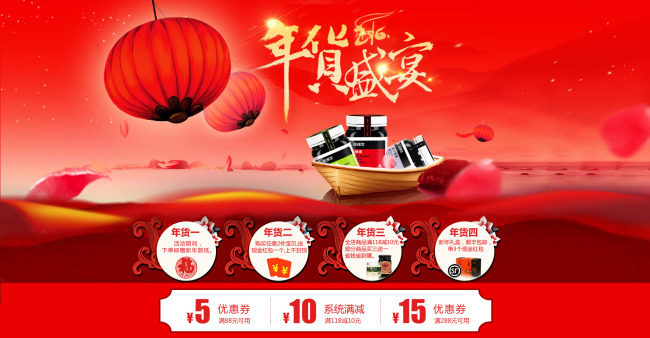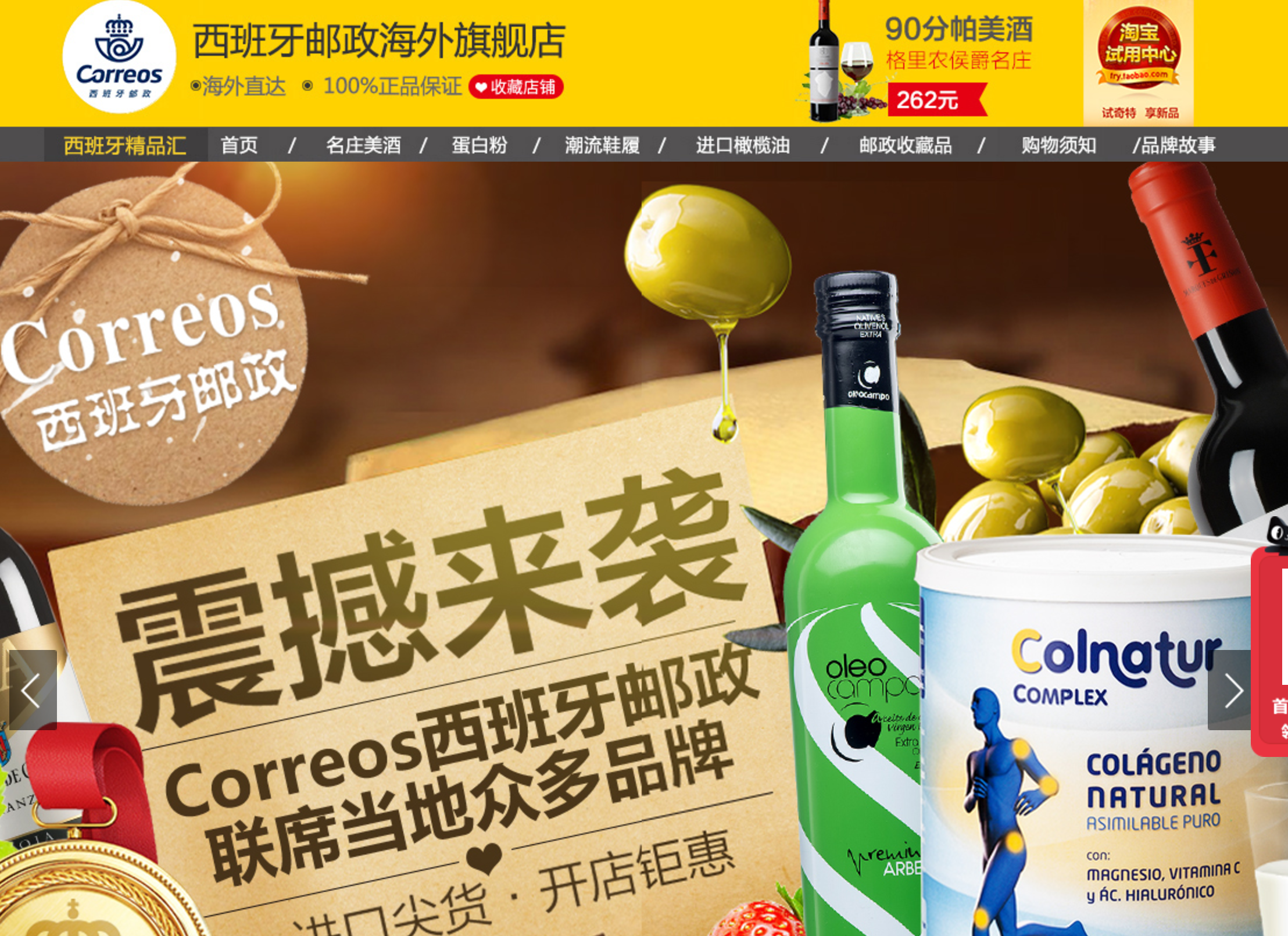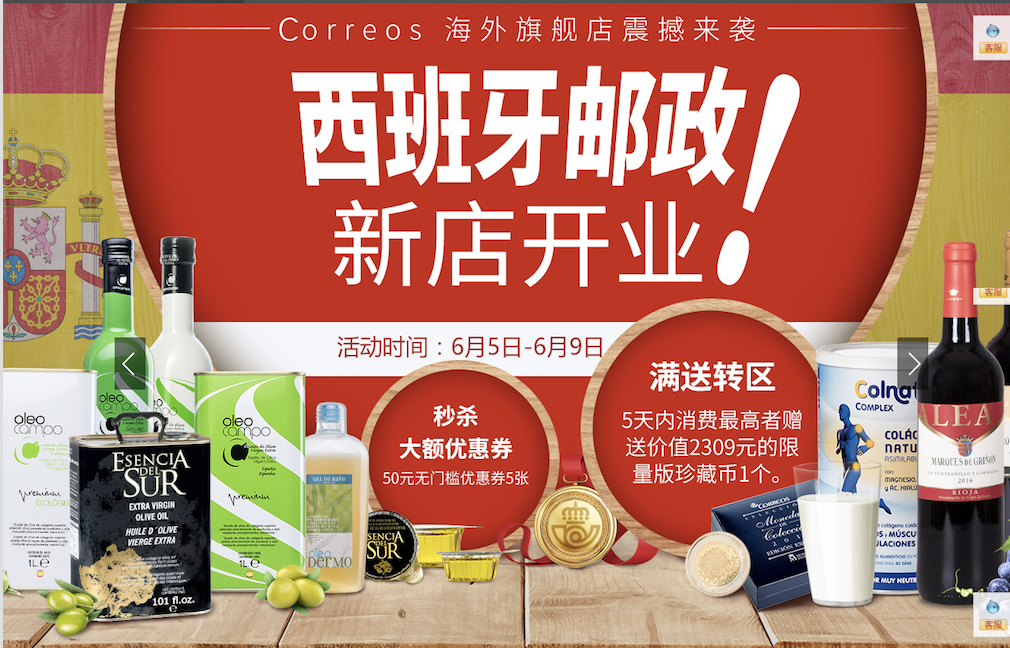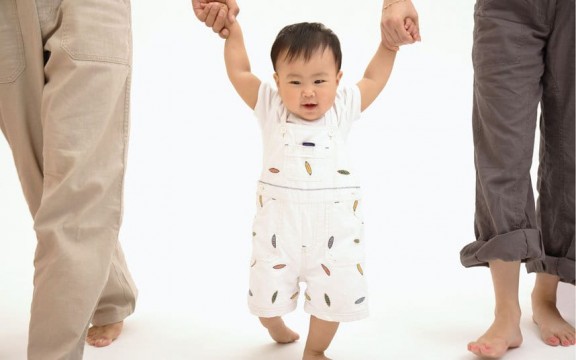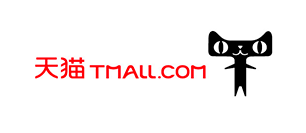Weibo social media crisis learning from Sesderma in China
With almost 400 million monthly active users by the end of 2017 on Weibo, without a doubt, every foreigner brand would consider Weibo as an important social media channel to build up awareness in China. We can imagine if one brand could appear on the top search topics, it may be because they have successfully created a big issue, but on the other hand, the popularity maybe also comes from unexpected negative feedbacks which a small issue could turn into a serious PR disaster in the blink.
We can always learn from other’s case and prepare tailored social media crisis management for our own brand in advance, and this time we learn from Sesderma’s experience.
Sesderma hit No.27 on the Weibo top search topics
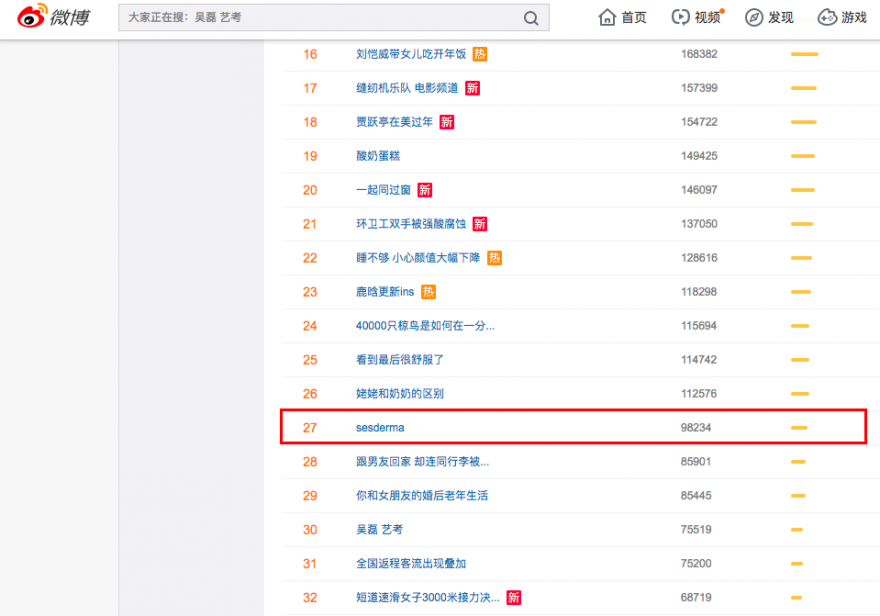
On the daily social media monitoring, we found that Sesderma, the well-known Spanish dermocosmetics brand was on the hot search list on Weibo, but they were dealing with the crisis out of a careless mistake in China. Their account has more than 7,000 fans, but the brand name search volume was 14 times more, we can assume the negative news brought in lots of people who aren’t familiar with the brand Sesderma before. What caused the PR crisis exactly? Let’s get back to where the issue started.
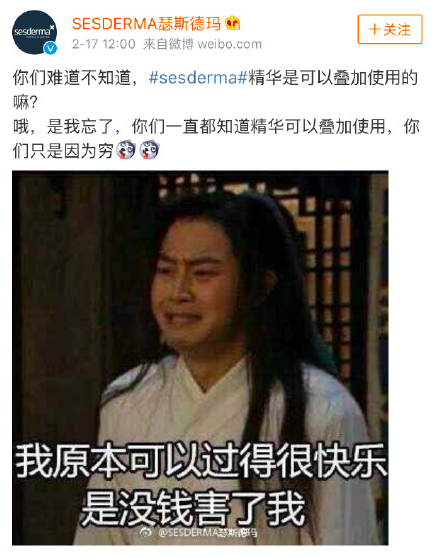
2/17 12 pm: Sesderma’s controversial post
Their intention was to educate the fans how to apply their product for a better result and created the post in a soft and self-deprecating way, but the critical part is they said “you” are poor and “you” don’t have money, so they misled the perspective and turned out to discriminate against the fans. Unfortunately, since then, the post started to accumulate passive comments in a quick-speed.
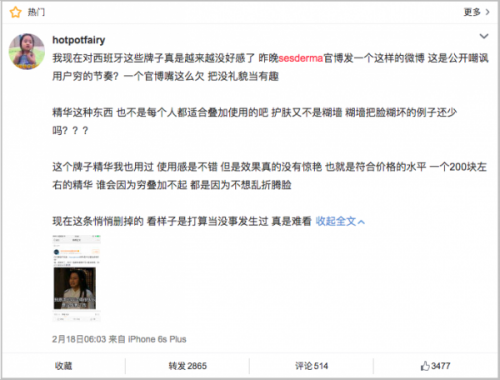
2/18 6 am: One user posted the negative feedback about Sesderma’s post (share:2,865 / comments:514 / likes:3,477)Not only the improper content, but the way Sesderma managed the issue. The user found Sesderma directly deleted the original post and without responding to fans’ anger. The post just went viral afterward, and it easily pushed Sesderma on the hot search list on Weibo.
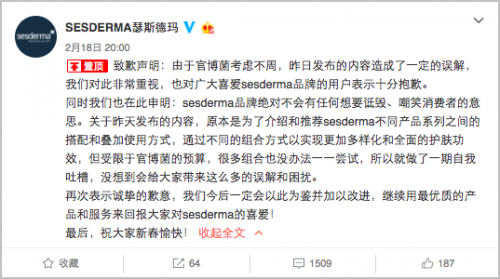
2/18 8 pm: Sesderma apologized sincerely to their fans
After waiting for more than one day, Sesderma had an official post to apology for their careless mistake. According to the comments, most of the fans could accept and left their support notes, but Sesderma continued to occupy the hot search topic position, until late afternoon on 2/20. Social media crisis comes easily, but it’s definitely hard to disappear.
3 takeaway to prepare crisis management on social media in China
1/Respond timely and as long as the mistake is confirmed, a sincere apology and open communication is needed
In many cases, actually, the crises are avoidable, if we can manage the potential crisis timely, and organize the crisis management team if necessary with members from involved departments, to create a open dialogue with fans within 24 horas.
2/Self-deprecating humor is easily taking over on social media, but extra care and attention for this kind of content is crucial
Sometimes self-deprecating humor is delicate, it’s better the content can be viewed and checked by different people to taste the respond. And keep the first person perspective clearly through whole content, as we can see in the Sesderma’s case, as long as you change the perspective, self-deprecating post could backfire quickly.
3/Chinese local team represents the foreign brand in China, so it’s important to work closely with headquarter to deliver the brand value
Even though many foreign brands have local subsidiary or agency to execute all the Chinese market marketing communications in China, but work integrally and have regular meeting is essential to keep both parts on the same track towards the ultimate success.
If you are interested in developing business in China through online marketing and e-commerce, 2 Open are glad to listen to you, please feel free to contact us by e-mail: INFO@2OPEN.BIZ, or just leave us a message below, we will get back to you as soon as possible.
Start preparing all your 2018 Tmall shopping festivals NOW
Here we highlight 6 key festivals in 2018 on Tmall that your brands cannot miss, because they contribute to the growth of the platform, and also the merchants.
Happy Double 11: Time to go shopping!
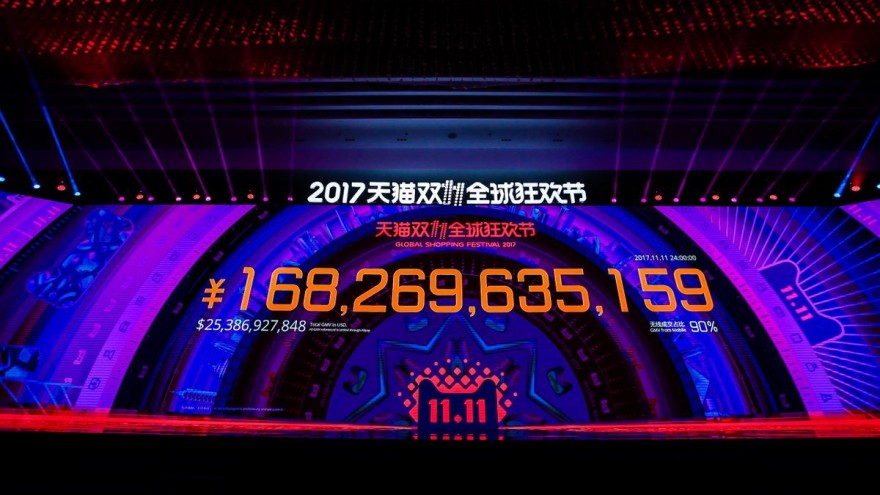
This year, Alibaba’s Singles Day Shopping Festival (also rebranded as double 11 Global Shopping Festival) entered into the ninth year. In 2009, retailer Alibaba turned the day into Chinese version of Black Friday. And eight years later, November 11, is becoming the biggest 24-hour online shopping festival on earth. Sales from Alibaba’s one day event has nearly doubled those from Black Friday and Cyber Monday in the US combined.
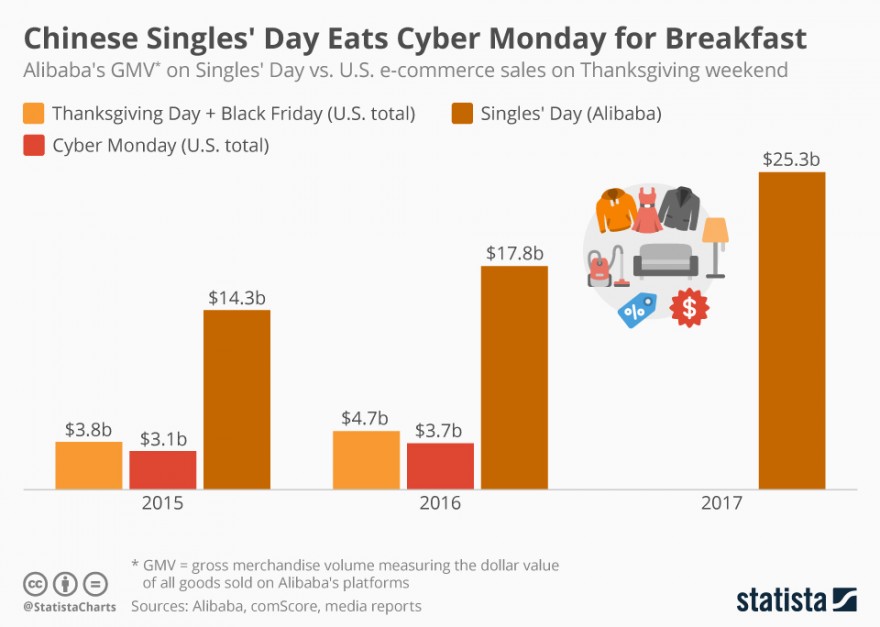
“Retail as entertainment” is one of the hallmarks of Singles Day. Alibaba is creating new sales record each year since 2009. In October last year, Jack Ma put forward the concept of “new retail”, which uses big data to seamlessly integrate online and offline activities. At zero hour on the day of November 11, consumers from China and other countries were all rushing in. Within 24 hours, they splurged on record-breaking $25 billion of purchases, a nice 40% increase from last year. As Alibaba’s CMO Dong Benhong said, not only we create consumer miracles, more importantly, the massive orders, the enormous amount of consumer data is captured. These real numbers provide data support for our next year’s business plan.
Here are some mind-blowing figures that sum up 2017’s Singles Day Global Shopping Festival:
$25.3 billion sales within 24 hours.
Alibaba smashing its own record from 2016 ($17.8B in year of 2016). The number reached as high as $5 billion in the first 15 minutes. In comparison, the total sales of Black Friday and Cyber Monday combined in the U.S. was only $6.79 billion in 2016. Behind this number, Focusing on providing a personalised experience and intelligent recommendations for consumers may have contributed to their success. Alibaba also said it had turned 100,000 physical shops around China into “smart stores” for this year’s global shopping event.
15 million products listed.
Over 60,000 global brands participated on this year’s “shopping party”. Familiar brand names such as Lululemon, Nike, Gap, Mac, and Macy’s. Products from US, Australia, Germany and South Korea were among most loved by Chinese consumers. In regards to what consumers actually bought on the day, baby milk powder, diapers, multivitamins, and other wellness related products were on the top of many people’s shopping list. As it is well known that health and safety are the top concerns of Chinese consumers.
90% mobile transactions
1.48 billion transactions were processed by Alipay, with 90% were done through mobile phone and tablets. Last year, mobile payments already accounted for 82% of Singles Day’s sales. In comparison, only about 30% of shoppers on Black Friday used mobile payments last year. China’s mobile payment system is more sophisticated and way ahead of many western countries. A great majority of Chinese consumers leapfrogged the era of desktop computers, moving straight to smartphones/tablets. It allows them to embrace Alipay’s convenience when making purchases through their devices.
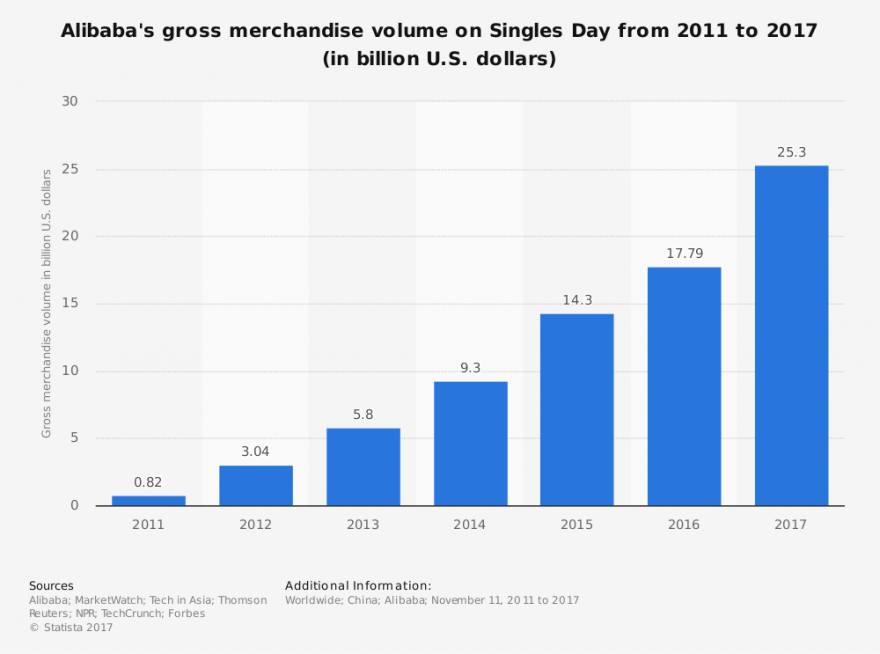
Summary
What truly sets the Single Day Shopping Festival is how Alibaba is leveraging its innovative technology combined with the scale of Alibaba’s entire ecosystem. It brings the future of retail in reality for Chinese consumers. With global trade closer than ever before, there has never been a better time to learn from the increasingly innovative retail landscape in China and to embrace the opportunities it presents.
The total retail market in China was nearly $5 trillion in 2016. By 2020, China will account for about 60% of global e-commerce. For consumer products companies, winning China means win the world!
Finally, here is a famous quote from Jack Ma, Alibaba’s founder. “Today‘s competition is brutal, tomorrow is even more brutal, but the day after tomorrow is beautiful. Most businesses die tomorrow night and can’t see the sunrise of the day after.”
Olive oil from Spain directly sold and shipped to China consumers (Tmall Global)
After the grand opening of Correos cross-border shop on Tmall global in June, our team did a purchase and tested the shopping experience. Here, we will share what is it like to purchase in Correos cross-border shop:
First of all, the brands sold in Correos shop are mainly famous local Spanish brands and have not registered in China yet. Therefore, these brands joined together and sell to Chinese customers in this novel model.
After searching in this shop for a while, we decided to purchase a box of olive oil as Spanish olive oil is known with high quality and good taste.
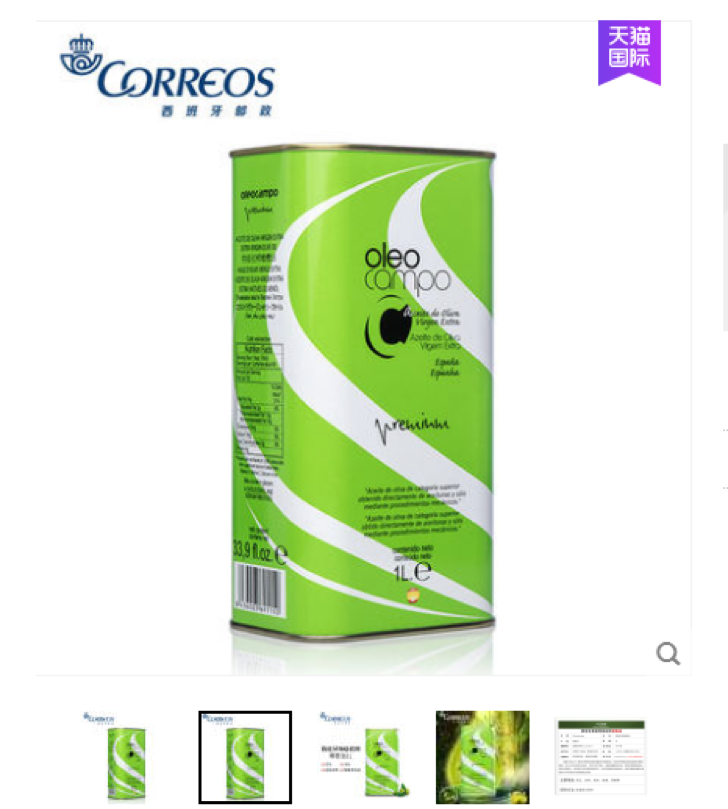 Then, we started chatting with the customer service to ask for more details of this product. The shop sales replied us immediately. He told us the Correos cross-border shop has a local office in Hangzhou, China, however, all the products are in Spain and will be shipped directly from Spain to China. He also told us that lead time is within 3 days and the delivery time is around 7-14 days depending on various factors such as weather, traffic etc.
Then, we started chatting with the customer service to ask for more details of this product. The shop sales replied us immediately. He told us the Correos cross-border shop has a local office in Hangzhou, China, however, all the products are in Spain and will be shipped directly from Spain to China. He also told us that lead time is within 3 days and the delivery time is around 7-14 days depending on various factors such as weather, traffic etc.
After all, we still decided to purchase this product and decided to pay and check out. There is personal cross-border purchase quota. We advise you to check it in here http://ceb2pub.chinaport.gov.cn/limit/outIndex before you make any purchases. Then, the buyer required us to submit a scanned copy of our ID, which will be used in the customs to clear the goods at the border.
Due to the long shipping distance, the shop does not take return merchandise. For testing, we finished payment and received a tracking number, which we can use to track our package online. For our order, we found out that the lead time is 2 days. After more than one week’s waiting, we finally received our olive oil 10 days after departure. Compared to our previous shopping experience on Tmall domestic, it feels slow but still within the time range they promised.
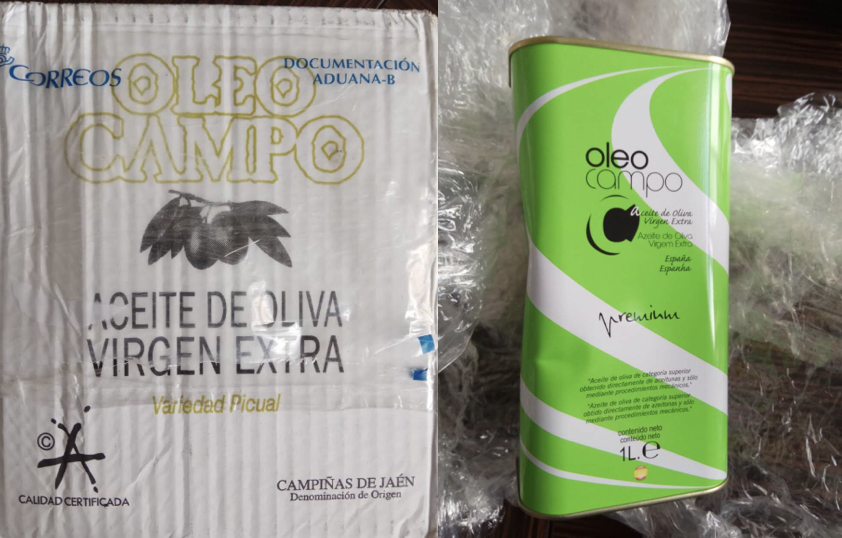 Unfortunately, our products exterior package is a little bit deformed probably due to the cushion put inside the package box is not enough. We sent a complaint to the customer service of Correos cross-border shop immediately.They were also sorry for this and decided to compensate 20 RMB to us.
Unfortunately, our products exterior package is a little bit deformed probably due to the cushion put inside the package box is not enough. We sent a complaint to the customer service of Correos cross-border shop immediately.They were also sorry for this and decided to compensate 20 RMB to us.
In general, we have a very satisfying purchase experience on Correos shop on Tmall global except for the relatively long waiting time.
The Spanish postal service, Correos, launched its Tmall global shop
Recently, Spanish post office Correo launched its oversea flag shop on Tmall global(an online B2C platform under China Alibaba Group) and started the trial operation. All the products sold in this flag shop come from major local brands in Spain and will be directly sent from the Spanish local brands’ warehouse to China.
 Last year, Alibaba’s Cainiao network announced the strategic collaboration with the Spanish post office Correos which significantly push forward the cross-border business and logistics services. After the flag shop is established, the delivery will be very convenient and fast. A staff working in Correos said “All the brands shown up in our flag shop are selected through deliberate consideration.” Since Correos has major advantage of its domestic logistics service in Spain, it only takes 7 to 14 days for Correos to deliver the products from the warehouse, transfer them to EMS and finally arrive at buyers’ designated address. Buyers can track the information on both Correos and EMS websites.
Last year, Alibaba’s Cainiao network announced the strategic collaboration with the Spanish post office Correos which significantly push forward the cross-border business and logistics services. After the flag shop is established, the delivery will be very convenient and fast. A staff working in Correos said “All the brands shown up in our flag shop are selected through deliberate consideration.” Since Correos has major advantage of its domestic logistics service in Spain, it only takes 7 to 14 days for Correos to deliver the products from the warehouse, transfer them to EMS and finally arrive at buyers’ designated address. Buyers can track the information on both Correos and EMS websites.
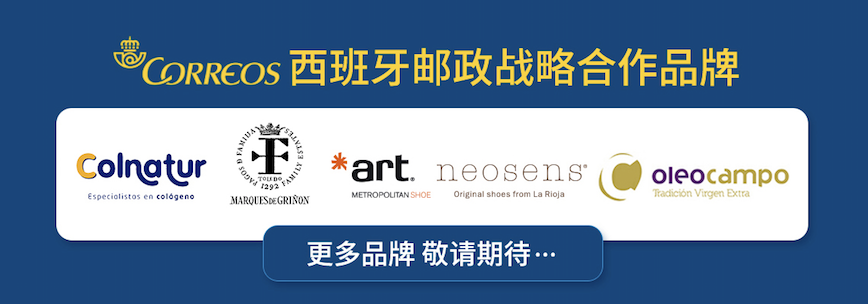
The brands in the Correos flag shop include:
- Oleocampo: a high-end olive oil made in Spain
- Colnatur: a protein powder brand with protein powder products suitable for both sports fitness people and middle aged people.
- ART: a Spanish fast fashion shoe brand
- Neosens: one of the high-end shoe brand from La Rioja, Spain
- Marques de Grinon: one of the high end Spanish wine brand
- Correos: main products are stamps and commemorative coin collection
However, Correos is not the first foreign country’s postal service company that launches Tmall global shop. UK’s Royal Mail, Australia Post and Northern Europe’s Post Nord have already had their Tmall global shop online.
Alibaba high-end membership APASS, what the luxury brand needs to know
September 9th was Alibaba’s APASS Day
Red carpet, hot girls and boys dressing up, while this is not a movie award ceremony, it is the first APASS off-line anniversary event held by Alibaba recently in Shanghai. They also invited Martha Lahti, SKII, Estee Lauder and many other international brands to join.
At this event, Alibaba Chief Marketing Officer Dong Benhong first revealed the level of APASS spending: “Based on the current membership size, these APASS members spend at least 30 billion RMB of their net purchases each year.”

Who is this group of people?
According to Ali group customer experience drive and Innovation Center General Manager Wang Hai, he said “APASS members are mainly trendy mothers, business elites, online shoppers and business generation”.
Here we have some examples. Zhang Yixin is a freshman in college. She spent 1 million last year on beauty products, jewelry and other luxury goods to simply just dress herself up.
Wang Ruoxi has 12 years of experience on Taobao. She would spend 800 thousand to buy luxurious watches and many other pricy goods including exorbitant Martha Lahti. Last year, she bought 16 brand-name handbags on Taobao. Right now, she makes her own skin care brand on Taobao’s line and transitions into a seller from a buyer.
In addition to our “super-chop type” buyers, Zhu Rongfei, one of the APASS members, is a “collection type” buyer. She bought more than 300 sets of Lego Limited Edition toys online as she is a maniac Lego fan.
What is APASS?
This lavish style of spending has made them gain the Alibaba Passport, also called APASS. It is an exclusive rewards program and a combination of Facebook, Amazon Prime and the American Express Black Card. Its 100,000 members get unusual perks in daily life such as abnormally good deals on trips, free return of products purchased online and considerate personal service. Meanwhile, they are also encouraged to join online communities of shopaholics who blog and talk up Alibaba.
 When Zhang Yixin mentioned the APASS membership service, she spoke with excitement: “What moved me most was that once, just right before an important show I had the next day, I lost my dresses that I was going to put on. The exclusive customer manager managed to find a seller in the city at night and got me the dress in time. It was amazing.”
When Zhang Yixin mentioned the APASS membership service, she spoke with excitement: “What moved me most was that once, just right before an important show I had the next day, I lost my dresses that I was going to put on. The exclusive customer manager managed to find a seller in the city at night and got me the dress in time. It was amazing.”
What luxury brands should know about APASS?
If luxury marketers doing business in China want to understand Chinese consumers better, they need to pay for professional market research agencies to do it. The APASS program offers a shortcut for brands to achieve this goal. It not only allows them to gain insight into their potential consumers, but it also shows them who they should target directly.
Even though it remains ambiguous whether APASS truly has what it claims to offer to luxury brands in China, brands such as Louis Vuitton, Ocean glasses, Antonio Banderas Guerlain, and Maserati are already among those who are beginning to test out what the APASS can reach.
If you need help to sell in China, contact us!
[recent_posts count=”3″ date=”true” thumbnail=”true” category=”1″]
New Trends of Chinese Consumers
After being awakened by the influence of the western modern lifestyle, and the material richness, the Chinese consumers have more confidence now. The Chinese consumers’ patterns and consumption behavior are changing significantly these year. Let’s check around the new trend of Chinese consumers.
- To be distinctive / unique
Cenozoic consumers are not satisfied with popular brands only. They are looking for more customized / personalized products to make themselves look different and unique. That’s why the special-interest brands are growing rapidly recently. These brands usually have their creative products which meets the unique demand of specific consumers. More importantly, these brands help consumers to realize their dream of being distinctive and unique.
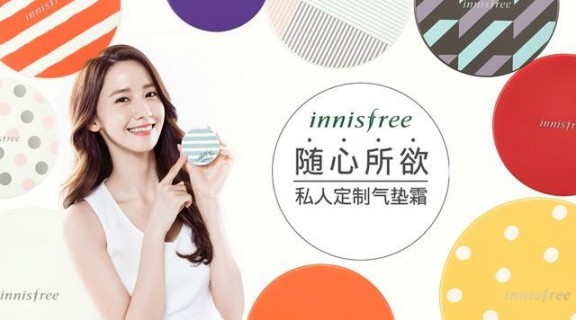
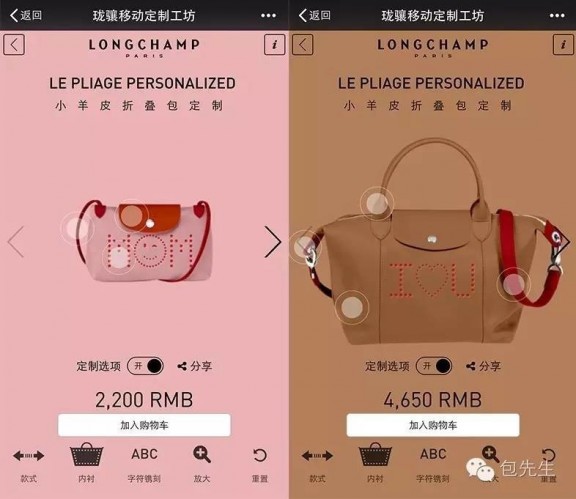
- To express, to share, to transmit
Chinese consumers have strong will to share (no matter it is their selfies, or daily life update, or the products they purchased) especially on Social Media which is a manifestation of self consciousness. Various Social Media platforms provide Chinese consumers with a channel to showcase their lifestyles, taste and opinions. Behind the motivation of showing their unique opinion or taste, there is a purpose to gain the social identity as well.
[logos]
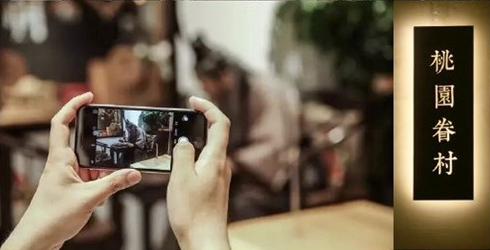
[/logos]
- Increasing attention and concern about health
Chinese consumers concern a lot about “Eating”. The attention and concern about “Healthy Food” is keeping increasing these years, such as water, juice, diary products. Consumers’ awareness of health is growing and they are willing to pay for the healthy food with good quality. Therefore, in order to cater to the consumers’ demand, more and more brands upgrade their products and adding the “Healthy” concept as much as possible.
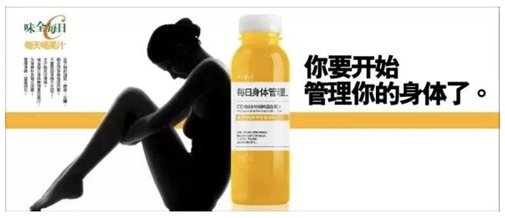
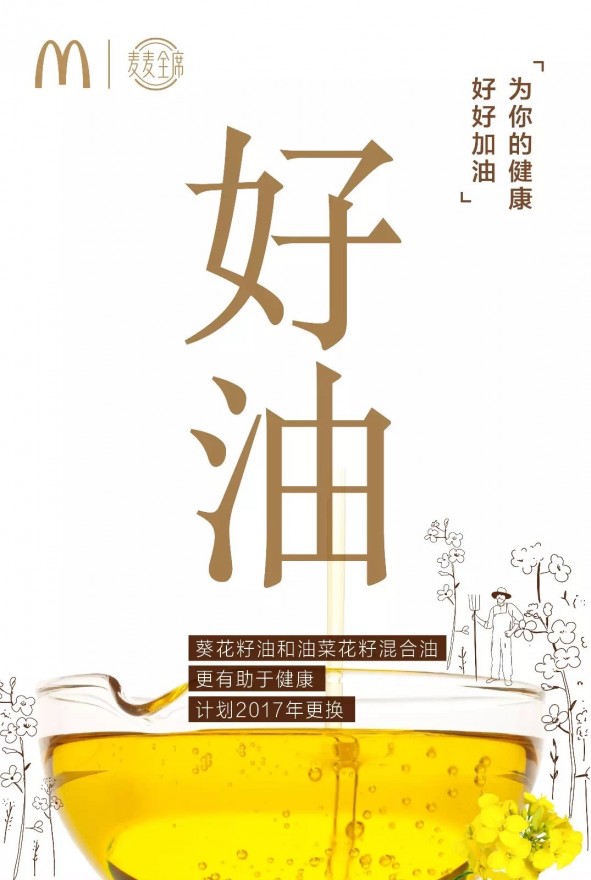
- Convenience is the king
“No time” has been the pain of today’s consumers. They are too busy to struggle between workplace and home. Today’s consumers are willing to spend money to get themselves free from those boring, repetitive daily activities. The numerous door-to-door services have spoiled most consumers by eliminating the time and troubles and increasing the convenience.
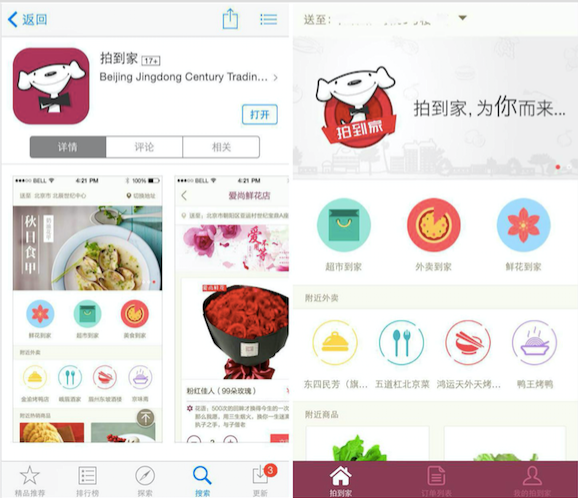
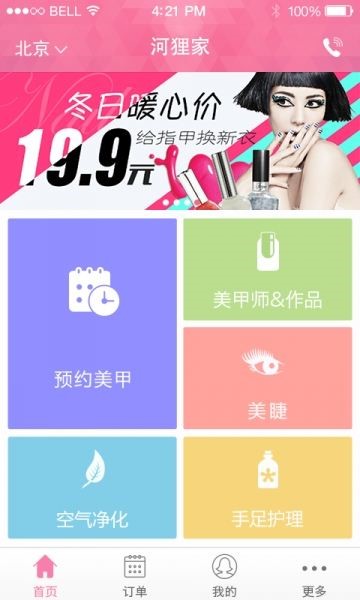
- Cross-border Shopping
Chinese consumers are now turned out to be global shoppers. As Chinese government launches more policies and regulations of Cross-border e-commerce, the picture of it has been more clear now. Besides the luxury products, the electronics household appliances, mother and baby products, and other daily necessities have been listed on Chinese consumers’ shopping list now.
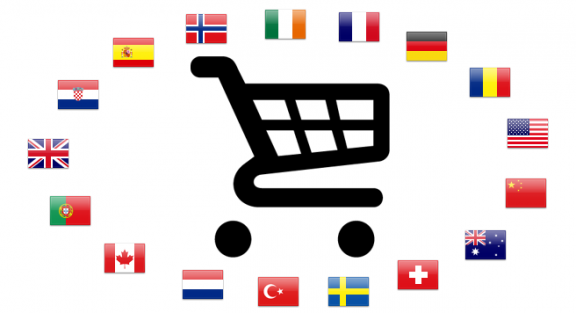
Chinese mother & baby industry is booming
A Glance Embraced the Consumers of Mother & Baby Products
Mother & Baby industry is well-known as a “sunrise” industry, and with the full liberalization of China’s second child policy, the birth rate of Chinese children will face ushered in a new peak, bringing prosperity to mother and baby industry. Instead of talking about the macro market and the brands perspective, let’s take a glance from the point of view of consumers today.
2016 Mother & Baby Products Consumption Ranking Per Capita (RMB)
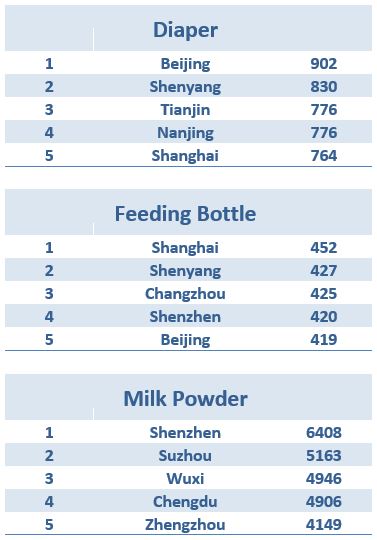 The avg. monthly spending on Mother & Baby products is 3,000 RMB. In Yangtze River Delta Area, the avg. spending is 5-10% higher. Many mothers spend 1,000 to 2,000 RMB more for their 2nd baby than their first one.
The avg. monthly spending on Mother & Baby products is 3,000 RMB. In Yangtze River Delta Area, the avg. spending is 5-10% higher. Many mothers spend 1,000 to 2,000 RMB more for their 2nd baby than their first one.
The buying time for those mothers with 2nd child is different from shopping for their 1st kid. In general, mothers start purchasing products 4-5 months in advance when they are with the 1st child. However, for the mothers with their 2nd baby, they are concentrating on purchasing in the last month of their pregnancy.
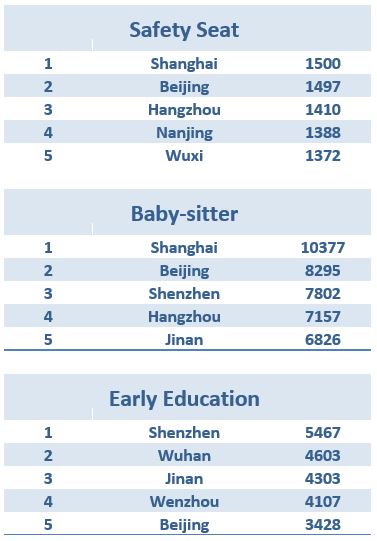
The online platforms and offline vertical shops provide more purchasing channels to mothers to buy proper products for their babies. It is feasible to pick up the products offline after ordering online as well.
The richer purchasing channels, the diversity of products, consumers start taking initiative to search and research products are the reflections of the consumption upgrade of Mother & Baby industry. These are the reasons why the industry is getting more and more mature in China market now.
2 OPEN can help you to enter the Chinese market through Ecommerce and Digital Marketing. Contact us to see if we can fit your needs.
Source: CBNweekly
2Open becomes Tmall Partner
2 Open is a certified Tmall partner. Being a tp partner 2open provides a full service to operate China sales through Tmall
The Lean Approach to Selling Online in China
In conclusion, start selling in China with 2Open in a record time. Most of the actual medium sized cannot, literally, afford to wait for bureaucratic complexities, licenses, or customs.



